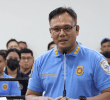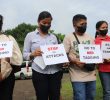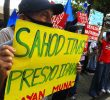Recognizing the myriad sacrifices that Overseas Filipino Workers (OFWs) endure, it is essential to shed light on another facet of the Filipino experience abroad. A fellow countryman’s response, “Andok ako kabayan eh,” resonates profoundly when questioned about returning home to reunite with his family. This individual shared the poignant reality that, due to lacking any valid documentation, aside from an expired visa and passport, he finds himself in an undocumented status. These undocumented individuals, often referred to as the “invisibles,” navigate the challenges of living abroad without official recognition or legal standing.
The term “Andok” might be familiar to some, or perhaps it’s a new designation for those acquainted with the more widely known “TNT” or “Tago-Ng-Tago.” This label pertains to Filipinos who have chosen to go into hiding to evade migration laws in foreign lands. While the concept of TNT gained popularity in the United States, there are numerous individuals, colloquially known as “Andoks,” dispersed across various countries. I’ve encountered several of them in the United Arab Emirates, Hong Kong, Singapore, Canada, the United Kingdom, chilly Iceland, Spain, and throughout the rest of Europe. The phenomenon of Filipinos living in discreet circumstances due to legal challenges transcends borders and is observed globally.
The “Andoks” face a distinct challenge as they are not officially recognized as Overseas Filipino Workers (OFWs). Their invisible status renders them particularly susceptible to exploitation, given their inability to secure a legal work contract and, consequently, demand fair compensation. In more severe instances, they may experience physical abuse or non-payment for their work, further exacerbated by their reluctance to report such incidents to the police out of fear of deportation. Unfortunately, even reaching out to Filipino authorities becomes a daunting prospect, as they have witnessed a failure to protect not only those without legal contracts but also those who have them.
The COVID-19 pandemic brought to light the profound challenges faced by the “Andoks,” particularly during this global crisis. While everyone experienced hardships, theirs were notably more severe. Accessing government support and subsidies proved to be an arduous task for them as many programs required identification, a barrier that deterred numerous “Andoks.” Regrettably, I became acquainted with several who, due to fear of exposing their undocumented status, refrained from getting vaccinated, tested, or, in case of infection, opted to endure the illness at home rather than risk disclosing their identities as migrants living without legal documentation.
Gratitude is owed to rights and welfare organizations representing diverse cultural backgrounds, unified under the umbrella of the International Migrant Alliance, as well as Filipino progressive groups like Migrante International. These organizations have played a crucial role in extending a helping hand to the “Andoks.” Their assistance ranges from purchasing and delivering groceries to addressing various medical needs, ensuring survival amidst the challenges of the pandemic. Notably, support includes facilitating access to testing, vaccinations, and aid for those bedridden due to COVID-19 infections. Recognizing the unique circumstances of these individuals, free food packs have proven very valuable, offering relief to those caught in a precarious “no work, no pay” situation. The collaborative efforts of these organizations underline the significance of collective action in providing essential support to vulnerable migrant communities.
The predicament of Filipinos finding themselves in such challenging circumstances can be traced back to the same root cause that compels many to become Overseas Filipino Workers (OFWs) — the scarcity of job opportunities in their homeland. The sacrifices made by these individuals for the sake of their families run even deeper. Unlike seafarers, OFWs, and migrants who may have the prospect of reuniting with their families at specific intervals, those facing such dire situations haven’t even contemplated the possibility of being with their families in the foreseeable future, let alone the distant one. Despite harboring dreams of an end to their predicament, the harsh reality persists, emphasizing the urgent need for comprehensive solutions to address the underlying issues of unemployment and economic challenges in the Philippines.
The Right Reverend Antonio Ablon of the Iglesia Filipina Independiente is presently the Chaplain of St. Catherine’s Anglican Chaplaincy in Stuttgart, Germany of the Diocese in Europe, Church of England. He is a former chaplain to the seafarers in Hamburg, Germany and Bishop of IFI Pagadian.
ofw, philippines, TNT









